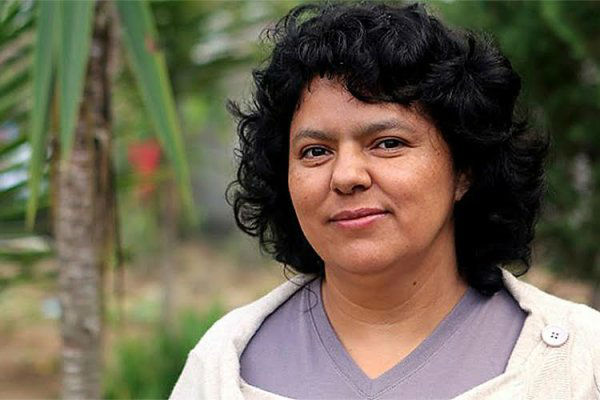The brutality inflicted on Berta Cáceres has become shockingly common in Honduras.
Four days before International Women’s Day, the world lost a feminist icon. Berta Cáceres, a powerful organizer for indigenous rights and democracy, was assassinated on March 3 in Honduras. Fellow activist Nelson García was murdered on March 15 after Honduran security forces violently evicted an indigenous Lenca community.
Cáceres was raised by a mother who was a midwife and governor, and Berta, as a young woman, started the Council of Popular and Indigenous Organizations of Honduras (COPINH). She led campaigns on a variety of issues but is particularly celebrated for mobilizing the Lenca people against the Agua Zarca dam, which threatened their access to medicine, food and water. The roadblock they built lasted a year. Through legal and community action, they convinced the International Monetary Fund and the Chinese company Sinohydro to withdraw from the project. The Honduran company DESA reinitiated the dam project on the Gualcarque River, which continues to be actively fought.
Often clad simply in a cotton shirt, jeans and sneakers, and living modestly, Cáceres embodied an empowering model of environmentalism and social justice.
In 2015, she was awarded the prestigious Goldman Prize for South and Central America, comparable to a Nobel Prize for the environment. When accepting the award, she said: “The Lenca people are ancestral guardians of the rivers, in turn protected by the spirits of young girls, who teach us that giving our lives in various ways for the protection of the rivers is giving our lives for the well-being of humanity and of this planet.”
Gustavo Castro Soto, coordinator for Friends of the Earth Mexico, was with Cáceres during the March 3 attack. He was injured and Cáceres died in his arms. He was later detained, held in inhumane conditions and questioned. After being released, he was escorted to the airport by the Mexican ambassador, but has been prevented from leaving the country. Authorities have issued orders to keep him in Honduras for 30 days.
Hillary Clinton
These events occurred within the context of Honduran leadership, which has stepped up repressive violence after the 2009 coup d’état, an act condoned by the United States. After the democratically elected president, Mel Zalaya, ordered a non-binding straw poll to consider revising the constitution, he was opposed by the military and judicial system, which escalated to his removal by the Honduran military and his flight to Costa Rica.
Several coup leaders trained at the US Army School of the Americas (since renamed), a breeding ground for numerous death squads and dictators in Latin American countries in the 1980s. The United Nations and the Organization for American States called Zelaya’s unseating a coup. But the US, including then-Secretary of State Hillary Clinton, sought “stability” pushing for “free and fair” elections. In her book, Hard Choices, she said the elections would “render the question of Zelaya moot.”
The brutality brought to Cáceres and Castro has become shockingly common in Honduras. Other members of COPINH have been attacked and killed. Overall, Honduras has been ranked the most dangerous country for environmental defenders and advocates, as the country has pursued the mass privatization of rivers and cities.
In the last few years, child refugees have jumped 40-fold, and 110 environmental activists and land defenders have been killed. Terror has reigned for citizens, while multinational corporations and financiers have been protected.
The deaths of Cáceres and García must be met with justice. There should be independent investigations into their murders with full accountability for the perpetrators; the safe return of Castro to Mexico; and an end to criminalization of the activities of COPINH and other environmental and indigenous organizations. But so too must the US deeply question its long history of Latin American regime change and support for brutal governments, even while ending security aid to Honduras.
Cáceres, a vocal critic of the coup, spoke of a way forward: “We must shake our conscience free of the rapacious capitalism, racism and patriarchy that will only assure our own self-destruction,” she said. “Let us build societies that are able to coexist in a dignified way, in a way that protects life.”
The views expressed in this article are the author’s own and do not necessarily reflect Fair Observer’s editorial policy.
Photo Credit: Milosz_M / Shutterstock.com / Berta Cáceres
 We bring you perspectives from around the world. Help us to inform and educate. Your donation is tax-deductible. Join over 400 people to become a donor or you could choose to be a sponsor.
We bring you perspectives from around the world. Help us to inform and educate. Your donation is tax-deductible. Join over 400 people to become a donor or you could choose to be a sponsor.
For more than 10 years, Fair Observer has been free, fair and independent. No billionaire owns us, no advertisers control us. We are a reader-supported nonprofit. Unlike many other publications, we keep our content free for readers regardless of where they live or whether they can afford to pay. We have no paywalls and no ads.
In the post-truth era of fake news, echo chambers and filter bubbles, we publish a plurality of perspectives from around the world. Anyone can publish with us, but everyone goes through a rigorous editorial process. So, you get fact-checked, well-reasoned content instead of noise.
We publish 2,500+ voices from 90+ countries. We also conduct education and training programs
on subjects ranging from digital media and journalism to writing and critical thinking. This
doesn’t come cheap. Servers, editors, trainers and web developers cost
money.
Please consider supporting us on a regular basis as a recurring donor or a
sustaining member.
Support Fair Observer
We rely on your support for our independence, diversity and quality.
Will you support FO’s journalism?
We rely on your support for our independence, diversity and quality.







